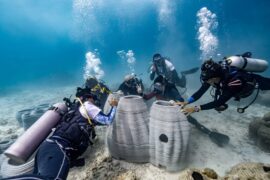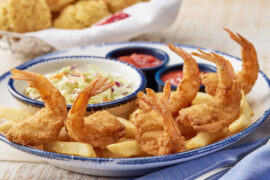It will soon be back to the rich deep sea fishing grounds above the Arctic Circle for Kirkella, now that Her Royal Highness The Princess Royal has officially named Britain’s newest distant waters fishing vessel. The ceremony was attended by officers, crew and shareholders of the ship’s owner, UK Fisheries, a subsidiary joint venture between Parlevliet & Van der Plas (P&P) and Samherji HF.
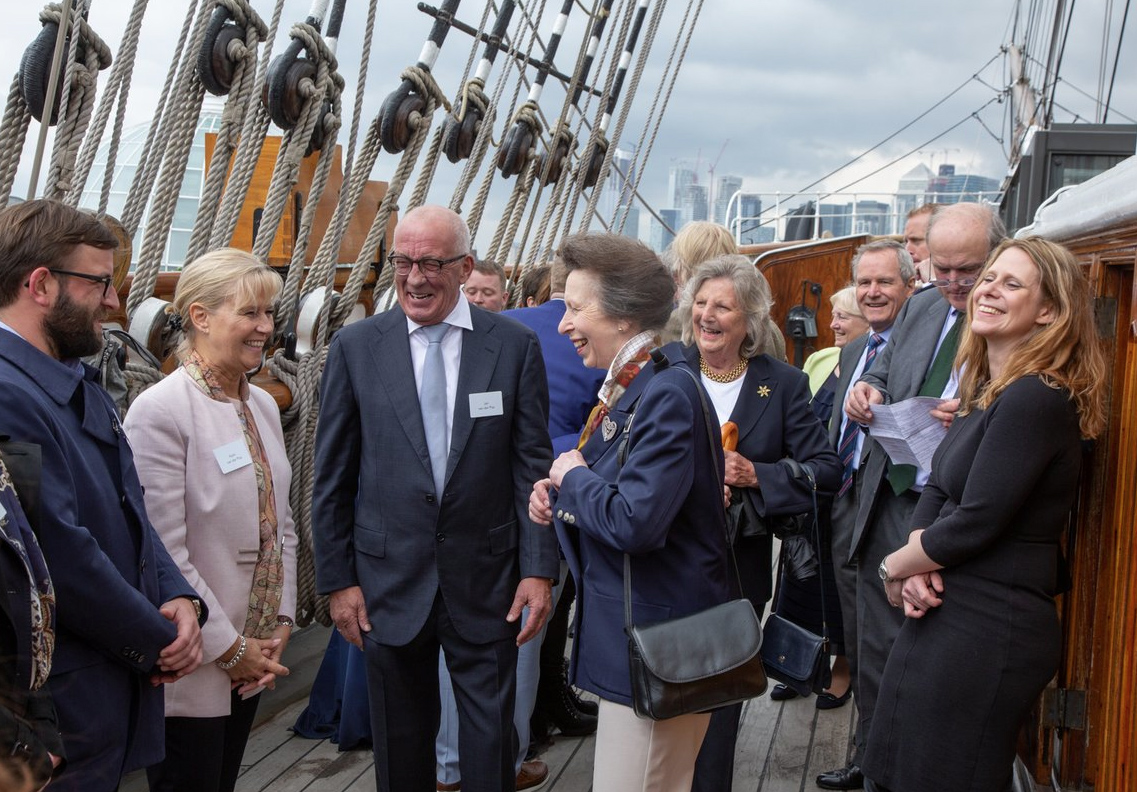 After naming the ship, Her Royal Highness (center) meets and greets invited guests and members of the public on the deck of the Kirkella.
After naming the ship, Her Royal Highness (center) meets and greets invited guests and members of the public on the deck of the Kirkella.
The state-of-art freezer trawler is named after England’s East Yorkshire village of Kirk Ella, and her home port is in the nearby city of Kingston upon Hull, which has a centuries-old tradition as an important base for the British fishing industry.
Decked out in bunting and naval flags, the 4,000-ton Kirkella steamed under a raised Tower Bridge before turning opposite the Tower of London and then returning to moor at Greenwich, close to Cutty Sark Gardens.
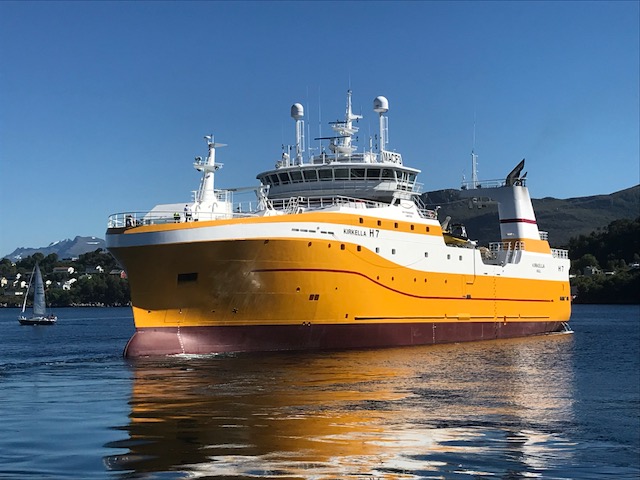 With 800 tons of fuel capacity, the Kirkella is powered by a main six-cylinder 4800hp 3600kW Rolls Royce diesel engine and an auxiliary engine.
With 800 tons of fuel capacity, the Kirkella is powered by a main six-cylinder 4800hp 3600kW Rolls Royce diesel engine and an auxiliary engine.
Accompanied by Colonel Jane Davis, Vice Lord-Lieutenant of Greater London, Princess Anne toured Kirkella after christening it the traditional way with a bottle of champagne.
Some 350 invited guests attended the event, and they and more than 1,000 members of the public were treated to a Kirkella-caught fish and chips lunch, courtesy of UK Fisheries.
“We’re delighted that Her Royal Highness was able to be with to name this beautiful ship, which will help secure the future for our distant waters fishing industry and maintain the proud fishing traditions of the northeast of England,” said Sir Barney White-Spunner, chairman of the advisory board of UK Fisheries.
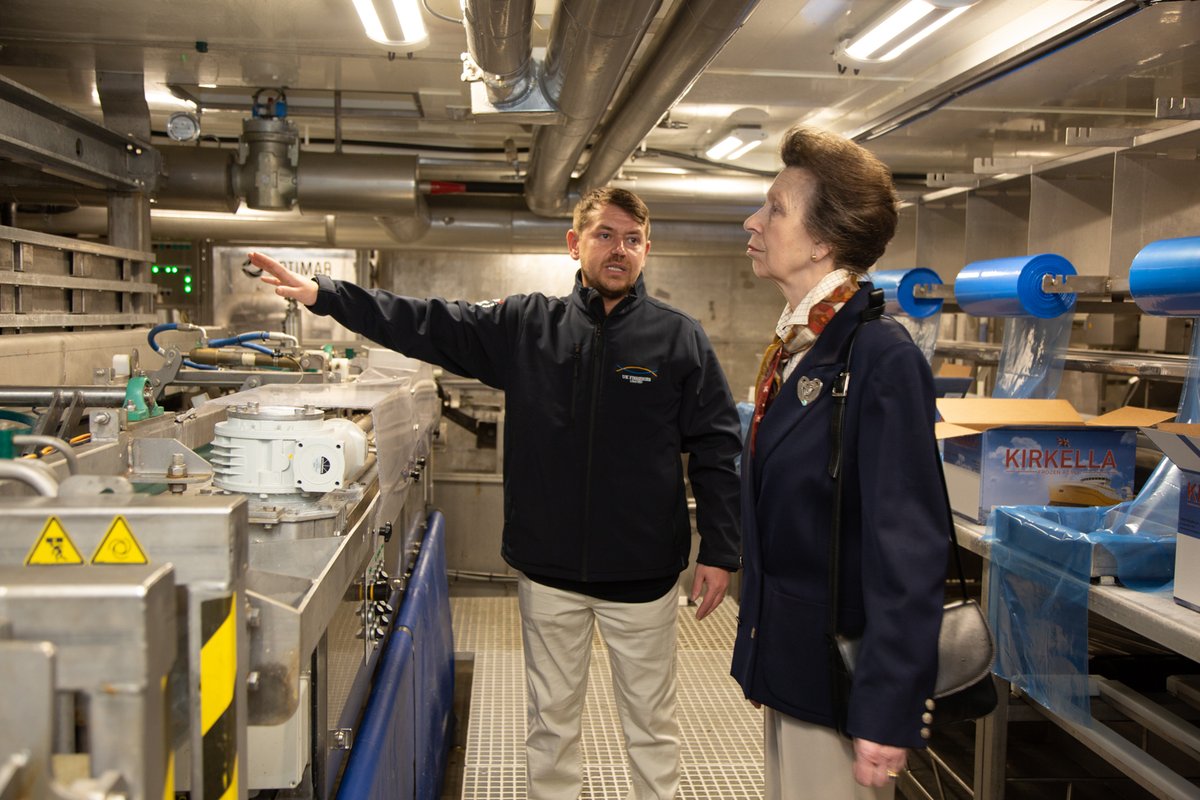 Her Royal Highness Princess Anne is escorted through the value-added production section of the Kirkella, where cod, haddock and other species of whitefish are processed into skinless frozen fillets bound for fish and chip shops and other destinations throughout the UK and beyond.
Her Royal Highness Princess Anne is escorted through the value-added production section of the Kirkella, where cod, haddock and other species of whitefish are processed into skinless frozen fillets bound for fish and chip shops and other destinations throughout the UK and beyond.
Designed by Rolls Royce Marine, Kirkella, was built at Norway’s Kleven Shipyard for approximately €35 million. Measuring 81 meters in length and 16 meters in width, it stands as high as three London buses above the waterline. With a crew of 30 and trips lasting between four and six weeks each to waters 1,500 miles north of her home port, she is expected to land around eight per cent of all the cod and haddock consumed at fish and chips shops across the United Kingdom.
Fish harvested primarily from the Barents Sea, Greenland waters, NAFO (northwest Atlantic), and Norwegian Sea are relayed to on-board freezers just 40 minutes after being caught. Aided by GPS, sensors on the nets and sophisticated control systems, each trawl lasts between 30 minutes and six hours. The nets are hauled onboard from the stern by powerful 2,000m cable winches and the catch is electronically stunned and conveyed to the onboard factory. The fish are filleted, frozen and packaged in a continuous, highly mechanized process.
Anything other than the prime fillets of cod and haddock are stored separately and processed into fishmeal to be used in animal feeds and as a fertilizer. The ship can store up to 780 tons of fish fillets at -28° Celsius in her on-board freezer.
Following the Kirkella’s five successful trips to Arctic waters last year, Sir Barney White-Spunner is optimistic about the future even with current uncertainty regarding access to fishing grounds in the post-Brexit future.
“The UK fishing industry is going to have real opportunities come next year,” he said. “Brexit has huge advantages for fishing if it is properly handled. Our concern is that it is not being properly handled.”
According to Barrie Deas, chief executive of the National Federation of Fishermen’s Organisations, the Common Fisheries Policy (CPF) of the European Union has allowed fleets from EU member states to catch six times as much fish in UK waters as British fishermen harvest from EU waters.
“It is asymmetrical,” he said. “Access to our markets is a source of leverage, but it is up to the government to use it.”
With quotas currently allocated under the CPF subject to reallocation in a post-Brexit environment, White-Spunner noted the United Kingdom will be “in a position as an independent coastal state to talk to our northern neighbors in Greenland, Iceland, the Faroes and Norway about the Northern External Waters, which is where a lot of our cod and haddock come from.”
While there is real opportunity, there is also concern about how the negotiations will fare. “But, played correctly by the government, a hugely exciting time” lay ahead, figures the UK Fisheries advisory board chairman.
White-Spunner anticipates the implementation of a series of agreements “with our northern neighbors, which work to everyone’s advantage…leading to the fishing industry in all those nations being enhanced, improved and continuing to be run very successfully.”
He concluded: “I also, of course, see that negotiations with EU nations will be part of it. But the point is, as an independent coastal nation we will be able to conduct those negotiations ourselves.”


